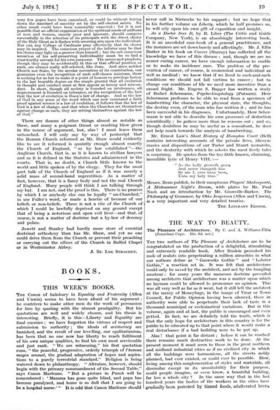BOOKS.
THIS WEEK'S BOOKS.
THE Canon of Salisbury in Equality and Fraternity (Allen and Unwin) seems to have been afraid of his argument : he contrives to make other men do the work of persuasion for him by. quoting with the utmost prodigality. But his quotations are well and widely chosen, and his thesis is interesting. Briefly, it is this—Liberty and Equality are final enemies ; we have forgotten the virtues of respect and submission to authority ; the ideals of aristocracy are banished, and the result of our levelling, our egalitarianism, has been that no one now has liberty to reach fulfilment of his own unique qualities, to find his own most serviceable and just rank. " We are witnessing," his first quotation runs, " the peaceful, progressive, orderly triumph of t'homme moyen sensuel, the gradual adaptation of hopes and aspira- tions to a purely terrestrial standard." Religion is being watered down to philanthropy. " Altruism, however, should begin with the primary commandment of the Second Table," says Canon Maclean. " But a picture in Punch will be remembered : ' Mamma has gone quite blind, and papa has become paralyzed, and home is so dull that I am going to be a hospital nurse.' " It is odd that Canon Macleane should
never call in Nietzsche to his support ; but we hope that
in his further volume on Liberty, which he half promises us, he will rely upon his own gift of exposition and insight.
As a Doctor Sees It, by B. Liber (The Critic and Guide
Company, New York), is an absorbingly interesting book. It is an anecdotal case-book of a general practitioner; and the instances are set down barely and affectingly. Mr. J. Ellis
Barker in his book on Cancer (Murray) has collected all the knowledge we have of this disease ; and, though we are no nearer curing cancer, we have enough information to enable us to make its incidence rare. The problem of the pre- vention of cancer, of .course, is economical and individual as well as medical : we know that if we lived in such-and-such conditions we should not fall victims to cancer ; but to change our conditions of life we need more incentive than a casual fright. Mr. Eugene S. Bagger has written a study of Rafael Schermann, Psycho-Graphology (Putnam). Herr
Schermann professes to be able to read from a specimen of handwriting the character, the physical state, the thoughts, the destiny even, of the man who has written it ; and he has been successful in his diagnoses. Unfortunately, Herr Scher-
mann is not able to describe his own processes of deduction scientifically ; he gathers more than he reasons out ; and so,
though doubtless he may be useful as a consultant, he does not help much towards the analysis of handwriting.
Mr. Ernest Law's Short History of Hampton Court (Bell) contains interesting accounts of the private lives, idiosyn-
crasies and dispositions of our Tudor and Stuart monarchs, and the dexterity with which he selects the most lively tales is surprising. He quotes from the too little known, charming, incredible lyric of Henry VIII. :—
" As the holly groweth green And never changeth hue So am I, ever have been, Unto my lady true."
Messrs. Benn publish, in their sumptuous Players' Shakespeare, A Midsummer Night's Dream, with plates by Mr. Paul Nash and an introduction by Mr. Granville-Barker. The Philosophy of Grammar, by Otto Jespersen (Allen and Unwin),
is a very important and very detailed treatise.
THE LITERARY EDITOR.


















































 Previous page
Previous page